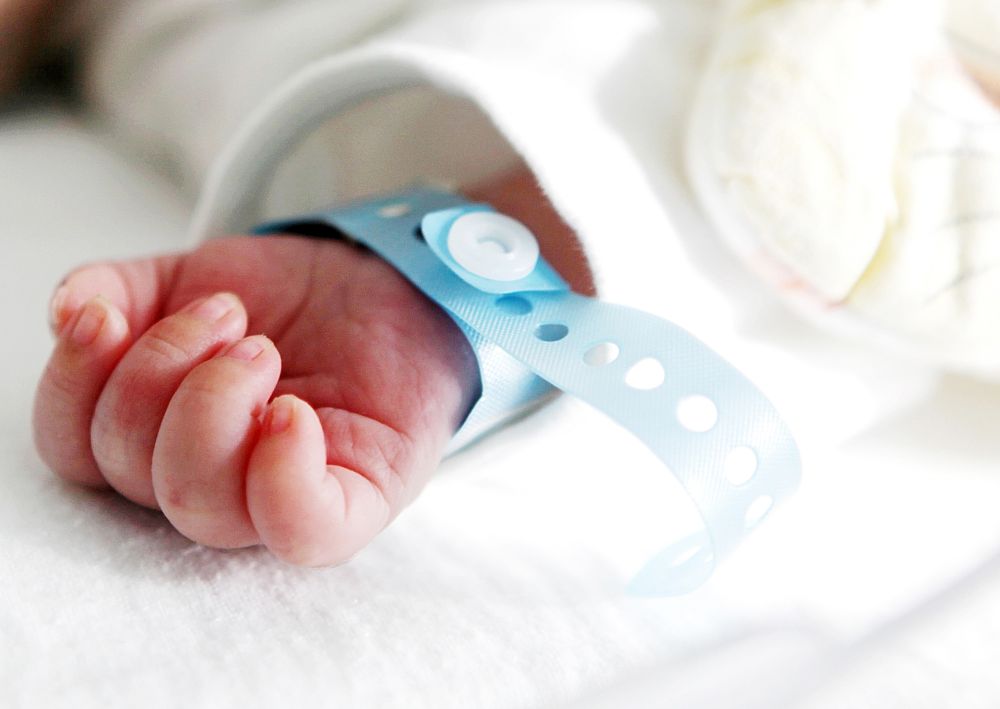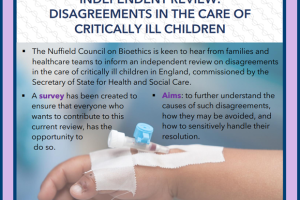18 May 2023

News
Independent review of disagreements in the care of critically ill children makes case for new Government taskforce
Our review of disagreements that arise in the care of critically ill children in England recommends the creation of a Government taskforce to take forward the changes our evidence has shown will help reduce the profound impacts for all involved.
In December 2022, the Secretary of State for Health and Social Care commissioned us to undertake an independent review of disagreements that arise in the care of critically ill children in England, following a Government commitment in the Health and Care Act 2022. We have now laid this review before Parliament and are encouraging the Government to act on our recommendations.
Throughout our work, we heard from people who have experienced such disagreements, including parents of critically ill children and healthcare professionals from hospitals across England. They have told us about the profound, wide-ranging and enduring impacts that disagreements in critical care can have on children, their families, healthcare professionals and others involved in their care. And we have learnt that this remains the case even when disagreements are resolved quickly and without the need for court intervention.
Although only a small percentage of disagreements end up in court, recent high-profile cases have shown that when disagreements become prolonged and play out in our legal system and in the public eye, they can be distressing and have long lasting implications for everyone involved.
We have identified some common factors in the causes of disagreements, and aggravators of existing ones. These include communication issues, mismatched expectations and a lack of information available to parents. Our review contains 16 recommendations across a number of areas, to a range of groups and organisations, which, if taken together, we believe will help improve the experience families and healthcare professionals have of navigating disagreements.
We are calling for a Government taskforce to drive forward our all of our recommendations, as meaningful change will only happen if the steps towards change are taken together, and oversight of this is crucial for ensuring effective implementation. Amongst our recommendations is a call for more information to be provided to families such as guidance on how to communicate with their child’s treating team, how to seek second opinions and raise concerns, and how to access emotional and practical support.
We also recommend NHS trusts provide more emotional support for healthcare professionals who are involved in disagreements with parents, and training in relationship-building to help improve communication between healthcare professionals and families.
We heard that parents receiving mixed messages about their child’s prognosis, care and treatment is a common contributory factor to disagreements arising, Accordingly, we suggest that guidance is developed for healthcare teams on how to seek information from children and parents about their communication needs, ensuring all team members are aware of these and are providing consistent messaging about their child’s care and treatment, particularly where the child is under the care of a multi-disciplinary team.
Natalie Michaux, Research and Policy Manager at the Nuffield Council on Bioethics, led the work undertaken during this independent review, she said:
The unique insights we have gathered throughout this review have helped us identify when and why disagreements arise, and most importantly what needs to change to help people navigate these difficult situations better. We are extremely grateful to everyone who spoke to us and shared their experiences so honestly.
One thing our review makes very clear is that there is no one approach we can take to improve things for everyone. Every person is unique, every illness is different and as such, every case requires its own approach."
Danielle Hamm, Director of the Nuffield Council on Bioethics said:
For our recommendations to have any lasting positive impact they must be seen and implemented as a collective, which is why we believe the Government forming a new taskforce with this overarching focus is key.”
Steph Nimmo, expert by experience as a parent of a critically ill child, and contributor to the NCOB review, said:
Parenting a critically ill child is an unparalleled journey through uncharted territory, where every decision feels like an impossible choice. When my newborn daughter was diagnosed with a rare and life-limiting disease, I found myself thrust into this world, learning to be her advocate , faced with unimaginable decisions. In the years since her death at the age of twelve I have dedicated my spare time to understanding the tipping points which can lead to disagreements and conflict between parents and their child's medical team.
As today’s report clearly demonstrates, good communication practices and practical and emotional support - for everyone involved - is at the heart of making lasting change. I sincerely hope that all of the recommendations outlined in the report are put into action to ensure that the parents and professionals caring for the most medically complex children in this country are both supported and heard."
Health Minister, Maria Caulfield said:
I would like to thank the Nuffield Council for carrying out this essential piece of research. We are delivering on commitments made in the Health and Care Act to understand how to provide the best care for children, parents and healthcare professionals when disagreements arise. We will consider the recommendations, and will update in due course.”





Share